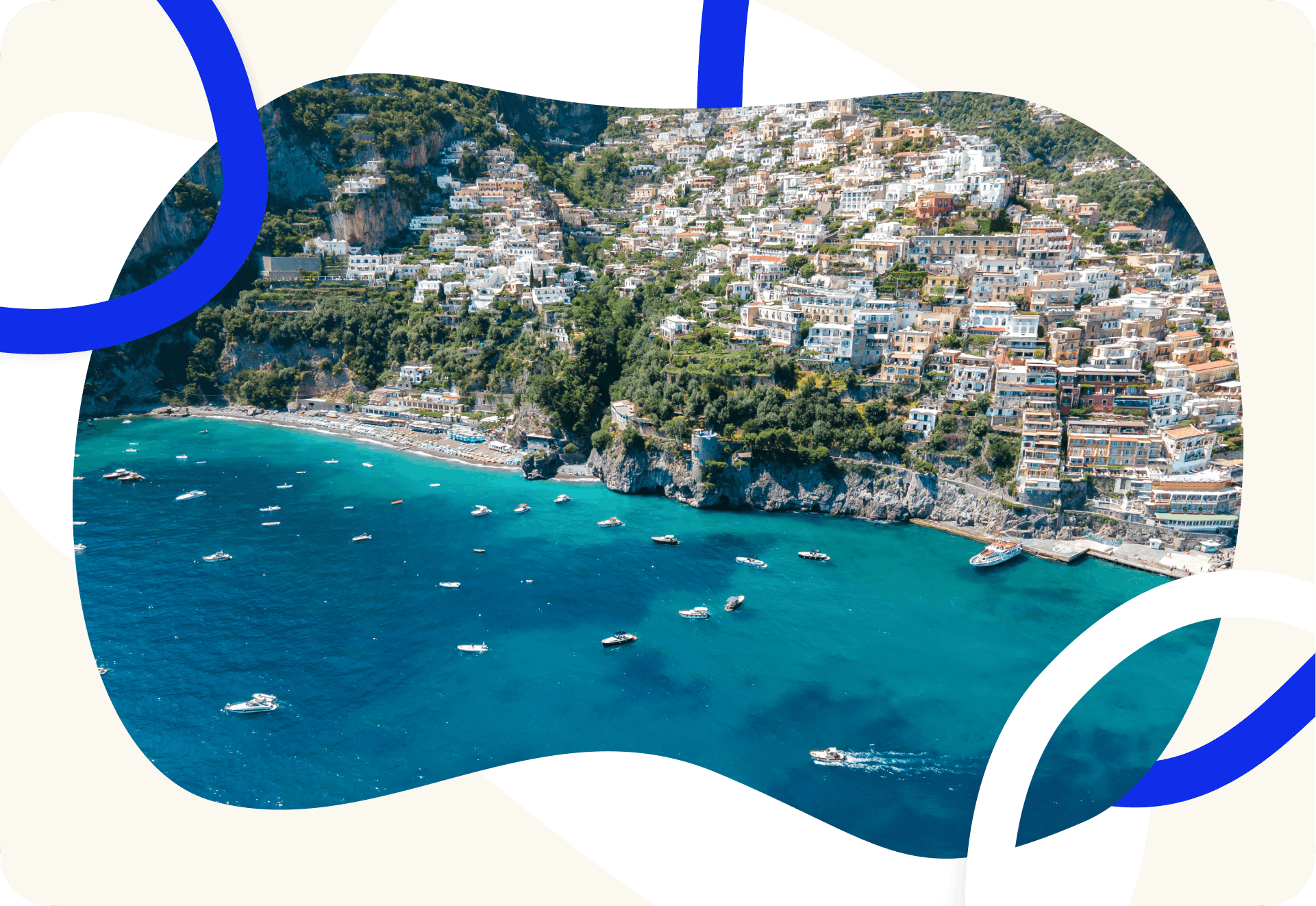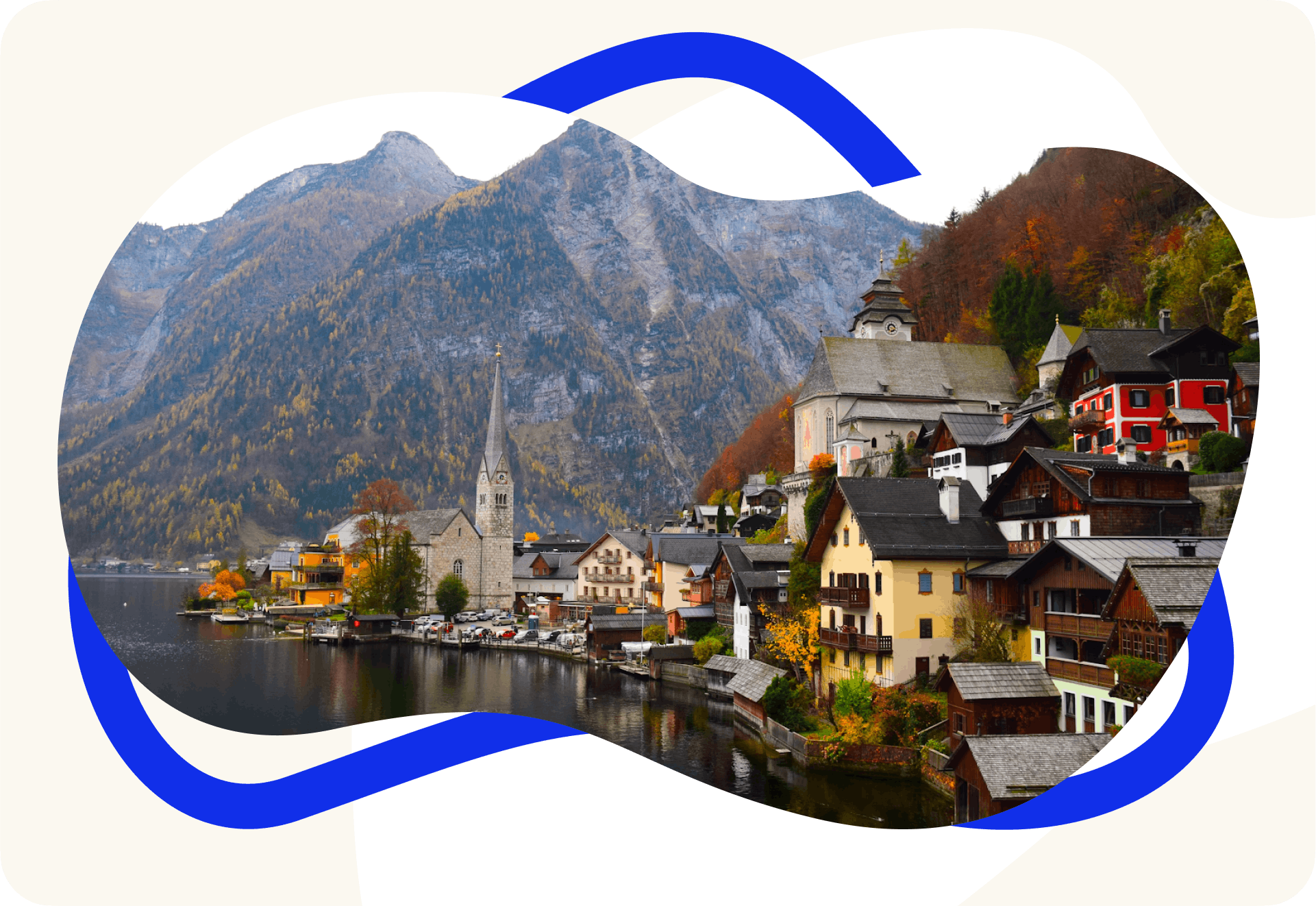With its rich history and vibrant culture, Italy is a dream destination for many digital nomads. Fortunately, Italy is now among the countries offering a digital nomad visa for remote workers and freelancers worldwide which can also be an excellent company perk for employers around the world to increase flexibility and boost productivity. If you want to help an employee experience the Italian lifestyle while pursuing their career, the Italian digital nomad visa may be the way to go.
This comprehensive guide will walk you through everything you need to know about the digital nomad visa in Italy. This includes eligibility requirements, application procedures, and tips for living and working in this beautiful country.
Does Italy offer a digital nomad visa?
After enacting a law for remote workers in March 2022, Italy officially launched its digital nomad visa in April 2024. This visa allows digital nomads outside the European Union (EU) to legally live and work in Italy.
This Italian visa, officially known as the "Visa for Remote Workers," is for freelancers, self-employed individuals, and foreign company employees who can perform their work duties remotely using digital tools. The visa typically grants a one-year stay with the possibility of renewal.
The new visa is a significant step for Italy, making the country competitive in the global digital nomad market. It's a win-win situation, as digital nomads get to experience the beauty and culture of Italy while contributing to the local economy.
Who is eligible to apply for Italy's digital nomad visa?
Italy's digital nomad visa is designed for non-EU citizens who can work remotely using digital tools. The visa is open to various professionals, including freelancers, self-employed individuals, and employees of foreign companies. Applicants must provide evidence of employment or freelance work with a company or clients located outside of Italy. Eligible documentation can include employment contracts, invoices, or other relevant documents.
Digital nomads must have comprehensive health insurance coverage that is valid for the entire duration of their stay in Italy. Additional documentation may be required depending on your specific circumstances. Consult the Italian embassy or consulate in your home country for a complete list of requirements.
What is the minimum income for a digital nomad visa in Italy?
As of 2024, the minimum income requirement for the Italian digital nomad visa is €28,000 annually. This figure is three times the minimum income level required for exemption from participation in the Italian healthcare system.
This means applicants must demonstrate a stable income exceeding this threshold to be eligible. A consistent source of income from remote work or freelance activities is essential to meeting this financial requirement.
What documents do you need to apply for Italy's digital nomad visa?
Here's a list of the essential documents you will need to prepare when applying for the Italian digital nomad visa:
- Application form: You'll need to complete the official visa application form, which you can typically find on the website of the Italian embassy or consulate in your home country.
- Valid passport: Your passport must be valid for at least three months beyond your intended stay in Italy.
- Proof of income: You'll need to provide evidence of your stable income, such as employment contracts, invoices, bank statements, or tax returns, demonstrating that you meet the minimum income requirement.
- Health insurance: You must have comprehensive health insurance coverage that is valid in Italy for the entire duration of your stay. The insurance should cover medical expenses, hospitalization, and repatriation.
- Proof of accommodation: You need to show proof of accommodation in Italy, such as a rental agreement, a hotel reservation, or a letter of invitation from a host.
- Clean criminal record: You'll be required to provide a recent criminal background check from your home country, demonstrating that you have a clean criminal record.
- Proof of remote work: This can include an employment contract, freelance agreements, or other documentation proving your ability to work remotely.
In addition to these core documents, you may be asked to provide additional information or documentation depending on your work circumstances.
What are the benefits of being a digital nomad in Italy?
Italy is a compelling choice for digital nomads because of its rich history, art, architecture, and culinary prominence. The country offers a relatively relaxed pace of life, with an emphasis on enjoying the present moment.
Italy also offers a good healthcare system and a general high quality of life. Ultimately, the freedom to live and work in a country as beautiful and culturally rich as Italy can lead to personal fulfillment and greater enjoyment of work.
Can I live in Italy without a digital nomad visa while working remotely?
Remote work assignments are more common than ever, but it's not always clear when a visa is needed. A digital nomad visa might be a good fit for remote workers, if one is needed. The EU's Practical Guide on the Applicable Legislation In The EU, EEA And In Switzerland sets guidelines for when a visa is needed.
For stays up to 90 days, visa nationals — citizens of countries that do not have a visa waiver agreement with Italy, will need a business visa. This allows stays of up to 90 days in a 180-day period. Non-visa nationals, which includes citizens of the USA, Canada, Japan, and others, can enter without a visa and are subject to the same limitation of 90 days in a 180-day period.
For stays longer than 90 days, visa nationals and non-visa nationals will need a visa., such as a digital nomad visa, if the remote worker qualifies.
How do I get a digital nomad visa for Italy?
Obtaining Italy's digital nomad visa involves a multistep application process. Here's a breakdown of the steps involved:
- Gather required documents: The first step is to collect all the necessary documents, which are outlined above. Ensure that your passport is valid and that you have comprehensive health insurance coverage for your stay in Italy.
- Complete the application form: Fill out the official visa application form, available on the website of the Italian embassy or consulate in your home country. Be sure to provide accurate and up-to-date information.
- Schedule an appointment: Contact the Italian embassy or consulate to schedule an appointment to submit your application. Be prepared for potential waiting times, as appointments may be limited.
- Submit your application: You must submit your completed application form and all the required documents during your appointment. You may also be asked to provide biometric data, such as fingerprints.
- Pay the processing fee: The digital nomad visa application requires a processing fee. The amount can vary, so check the current fee with the embassy or consulate.
- Await processing: The processing time for the visa application can vary depending on several factors, including the volume of applications and your circumstances. It's advisable to apply well in advance of your intended travel date.
Receive your visa: Once your application is approved, you will receive your digital nomad visa, allowing you to enter and work remotely in Italy for the specified duration.
When should I start planning for an Italian digital nomad visa?
Given the multistep nature of the application process and potential processing times, it's recommended to begin planning for your Italian digital nomad visa well before your desired arrival date. Ideally, you should start the process three to six months before you would like to relocate.
However, remember that this is a new visa, and there's likely to be a rush of applicants, which can slow down the process. In addition, processing times can vary, and unforeseen delays are always possible. Starting early allows you ample time to address any issues that may arise and ensure a smooth application process.
Do digital nomads pay tax in Italy?
Once you receive Italy's digital nomad visa, you are considered a tax resident and subject to Italian income tax and social security contributions. This means you'll be taxed on your worldwide income, not just income earned in Italy. However, Italy has tax treaties with numerous countries to avoid double taxation. If your home country has a treaty with Italy, you can offset taxes paid in Italy against your home country's taxes.
Specific tax rates and obligations can vary depending on your individual circumstances, income level, and the nature of your work. It's best to consult a professional familiar with Italian tax laws to understand your liabilities and ensure compliance.
Further useful resources:
How to pay tax on a digital nomad visa in Italy?
To comply with tax obligations while on a digital nomad visa in Italy, you must file an annual tax return (Modello Redditi) in Italy, typically due in June or July of the following year. The tax return should include details of your income, deductions, and tax credits.
Once your tax return is processed, you will receive a tax assessment detailing the amount of tax you owe. You can then pay your taxes online or through authorized payment channels.
Besides income tax, you will also be liable for social security contributions. These contributions are typically withheld as a percentage of your income and cover various social benefits, such as healthcare and pensions.
What other types of visas does Italy offer for digital nomads?
While the new visa is an excellent option for remote workers, there are a few other visa pathways that digital nomads might consider, depending on their specific circumstances:
Self-Employment Visa
The self-employment visa is well-suited for freelancers and self-employed individuals who want to establish a business in Italy. It requires demonstrating your professional qualifications and a business plan.
Elective Residence Visa
The elective residence visa is designed for individuals with sufficient financial resources to support themselves in Italy without working. While not explicitly for digital nomads, it can be an option if you have passive income or savings.
Golden Visa for Investors
The "Golden Visa" is for high-net-worth individuals willing to invest significantly in Italian businesses. It offers a fast track to residency and potential citizenship.
Family Reunion Visa
Italy offers family reunification visas for spouses or eligible partners. Suppose a spouse or partner is an EU citizen or holds an Italian residence permit. In that case, they might qualify for a family reunion visa, allowing them to live and work in Italy.
It's important to note that each visa type's specific requirements and eligibility criteria can vary. It's advisable to consult with an immigration lawyer or expert to determine the most suitable visa pathway based on your circumstances and goals.
Further useful resources: Employee relocation guides
Frequently asked questions
The prospect of living as a digital nomad in a country like Italy can be exciting - and overwhelming. It's normal to still have questions about Italy and life as a digital nomad. Here are answers to some of the most frequently asked questions.
Is Italy good for digital nomads?
Italy's renowned scenery, architecture, and cuisine make it a good location for digital nomads. The country's diverse landscapes, from the rolling hills of Tuscany to the Amalfi Coast, offer breathtaking scenery and outdoor activities like hiking, cycling, and water sports.
From a culinary perspective, Italy is renowned for its fresh produce, regional specialties, and world-class wines. Dining out or cooking at home with local ingredients is always a delightful experience.
Italy also has a growing community of digital nomads and expats. This means you'll find plenty of networking opportunities, co-working spaces, and social events to connect with like-minded individuals.
Where to live in Italy as a digital nomad?
Like most countries, Italy has its share of metropolitan areas and rural regions. Among the major cities, Rome features iconic landmarks, a vibrant nightlife scene, and a diverse expat community; Milan is Italy's fashion and business capital, known for its creativity and innovation. Florence is renowned for its art and architecture while offering a more laid-back lifestyle than Rome or Milan.
Meanwhile, smaller towns like Bologna have large student populations, lively atmospheres, and more affordable living costs. Sicily's capital, Palermo, is a melting pot of cultures with a rich history and stunning architecture. It's an excellent option for digital nomads seeking a unique and affordable experience.
Ultimately, the best place to live as a digital nomad in Italy depends on your personal preferences and lifestyle. When deciding, consider factors like the cost of living, internet speed, co-working spaces, transportation options, and cultural attractions.
Does the Italian digital nomad visa lead to citizenship?
The Italian Digital Nomad Visa does not directly lead to citizenship, but it can be a stepping stone towards permanent residency and, eventually, citizenship.
After five years of continuous legal residency in Italy, you can apply for permanent residency. Then, after an additional five years as a permanent resident, you become eligible to apply for Italian citizenship by naturalization. While the journey to Italian citizenship may be lengthy, the digital nomad visa provides a legitimate pathway to live and work in Italy for an extended period, offering the opportunity to establish roots and pursue citizenship.




